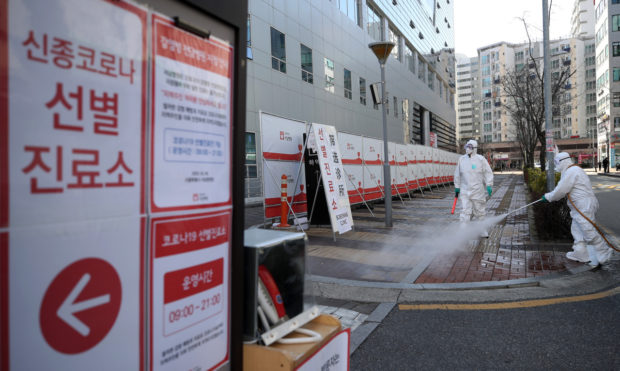Community spread of coronavirus on horizon in Seoul, surrounding areas
SEOUL — The South Korean government said Wednesday that it plans to distribute guidelines for densely populated workplaces where employees are especially vulnerable to the novel coronavirus, amid mounting concerns over community spread of the deadly virus in the country’s capital and surrounding cities.
The move came after at least 90 people, including 77 employees at a call center in Guro-gu and 13 people who came into contact with them, tested positive for COVID-19, making it the largest cluster of infections in Seoul so far.
For the whole of the country, 242 novel coronavirus cases and six more deaths were reported Wednesday, taking the total number of infections to 7,755 and the death toll to 60, according to data from the Korea Centers for Disease Control and Prevention.
In Seoul’s largest-ever cluster of infections, the patients worked together at the call center on the 11th floor of a 19-story building in Guro-gu, southeastern Seoul. Virus testing and an epidemiological study on 207 employees on the same floor were underway as of Wednesday afternoon.
Some 553 people, who work at the same call center but on different floors, were placed under self-quarantine to be tested for the virus.
Article continues after this advertisementFears about community spread grows as the transmission route remains unidentified and some of the employees at the call center began to show symptoms in late February.
Article continues after this advertisementOne 48-year-old patient showed symptoms of infection Feb. 29 but continued her daily routine until she tested positive Tuesday. She used public transportation to go to work, visited a hospital for treatment and had after-work dinners with coworkers, according to the inspection by the health authorities.
Five followers of the fringe religious sect the Shincheonji Church of Jesus, which is at the heart of the country’s virus outbreak, work at the call center, but all of them tested negative as of Wednesday afternoon.
The packed working environment at the call center, where employees sit close to each other in confined spaces and constantly talk into phones, is believed to have made it easier for the virus to spread.
Through the guidelines, the government will encourage businesses with packed environments — including call centers, educational institutes, fitness centers, nightclubs and karaokes — to allow remote working and adopt flexible work hours, and to reduce human density by adjusting seating arrangements.
Of the 242 new cases confirmed Wednesday, 52 were reported in Seoul and 12 each in Incheon and Gyeonggi Province. Most were linked to the call center in southwestern Seoul.
The call center case shows that the virus may have been spreading undetected in the country’s most populated areas and this time it may be harder to contain, experts say.
“So far, there have been hospitals and churches so the spread of the virus could be controlled to some extent,” said Kim Woo-joo, a professor of medicine at Korea University Guro Hospital who specializes in infectious disease.
“But in the case of the call center, there are many employees at the call center, they were confirmed to be infected days after they showed symptoms, which means those around them and many commuters on public transportation could have been exposed to the virus already.”
There were 131 new cases in the southeastern city of Daegu, which has been at the heart of the country’s virus outbreak, along with 18 in North Gyeongsang Province, according to the data. The cases in the region represent 90 percent of the country’s total.
Some 80 percent of the country’s total cases have been linked to infection clusters, 69.9 percent of which can be traced to the Daegu branch of the Shincheonji Church of Jesus, according to the KCDC.
The increase in cases in the country is driven by emerging clusters of infections involving medical facilities, social welfare facilities, religious facilities and workplaces, the agency said.
So far, 60 people, mostly those in their 60s or older with underlying illnesses, have died from COVID-19 here, with the overall fatality rate at 0.77 percent. The death rate here stands at 4.35 percent for those in their 70s and 7.2 percent for those in their 80s.
As the number of cases is soaring in Italy and Iran, the government said it will beef up health checks on those who enter Korea from Italy and Iran. Those arriving from the country will be required to get fever checks and fill out forms on their health conditions.
The move came after a 24-year-old man who arrived here after visiting Italy last week tested positive for the virus Tuesday.
A total of 7,407 people confirmed with novel coronavirus remain in quarantine, while 288 people have been released after making full recoveries.
The number of people awaiting test results for the virus stood at 18,540. The country has so far tested a total of 214,640 people, with 196,100 testing negative as of Tuesday midnight.
For more news about the novel coronavirus click here.
What you need to know about Coronavirus.
For more information on COVID-19, call the DOH Hotline: (02) 86517800 local 1149/1150.
The Inquirer Foundation supports our healthcare frontliners and is still accepting cash donations to be deposited at Banco de Oro (BDO) current account #007960018860 or donate through PayMaya using this link.
